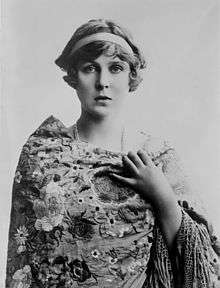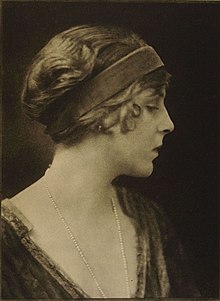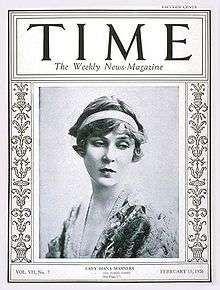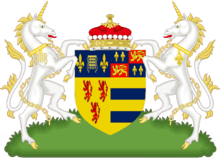Lady Diana Cooper
Diana Olivia Winifred Maud Cooper, Viscountess Norwich (née Lady Diana Manners; 29 August 1892 – 16 June 1986) was a famously glamorous social figure in London and Paris. As a young woman, she moved in a celebrated group of intellectuals known as the Coterie, most of whom were killed in the First World War. She married one of the few survivors, Duff Cooper, later British Ambassador to France. After his death, she wrote three volumes of memoirs which reveal much about early 20th-century upper-class life.
The Viscountess Norwich | |
|---|---|
 | |
| Born | Lady Diana Olivia Winifred Maud Manners 29 August 1892 London, England |
| Died | 16 June 1986 (aged 93) London, England |
| Occupation | Actress, socialite |
| Spouse(s) | |
| Children | John Julius Norwich |
| Parent(s) |
|
Birth and youth

Officially the youngest daughter of the 8th Duke of Rutland and his wife, the Duchess of Rutland, Lady Diana's biological father was the writer Henry (or Harry) Cust.[1] As early as 1908, various pamphlets were being circulated by a former governess claiming that Cust fathered Diana Manners, and David Lindsay (a distant cousin of her mother) noted in his diary that the resemblance was said to be striking.[2] In her prime, she had the widespread reputation as the most beautiful young woman in England, and appeared in countless profiles, photographs and articles in newspapers and magazines.
She became active in The Coterie, an influential group of young English aristocrats and intellectuals of the 1910s whose prominence and numbers were cut short by the First World War. Some see them as people ahead of their time, precursors of the Jazz Age.
Lady Diana was the most famous of the group, which included Raymond Asquith (son of H. H. Asquith, the Prime Minister), Patrick Shaw-Stewart, Edward Horner, Sir Denis Anson and Duff Cooper. Following the deaths at relatively young ages of Asquith, Horner, Shaw-Stewart, and Anson—the first three in the war; Anson by drowning—Lady Diana married Cooper, one of her circle of friends' last surviving male members, in June 1919. It was not a popular choice with Diana's parents who took a dim view of his lack of title and wealth, and his drinking, gambling and womanising. They had hopes for a marriage to the Prince of Wales. As for Cooper, he once impulsively wrote a letter to Lady Diana, before their marriage, declaring, "I hope everyone you like better than me will die very soon."[3] In 1929 she gave birth to her only child, John Julius Cooper, later the 2nd Viscount Norwich and known as John Julius Norwich, who became a writer and broadcaster.
Career on stage and in silent films

She worked as a Voluntary Aid Detachment (VAD) nurse at Guy's Hospital during the war, and later at a hospital for officers her mother set up in London (though she annoyed her co-workers with her inconsistent attendance, and tendency to take off with friends). She also worked briefly as editor of the magazine Femina, & she wrote a column in the Beaverbrook newspapers before turning to acting. Her work as a nurse increased her popularity and public notoriety. Her name appears in the wartime version of the music hall song Burlington Bertie: "I'll eat a banana/with Lady Diana/Aristocracy working at Guy's".[4]
Already in 1918 Lady Diana took uncredited roles; in The Great Love she played herself in her capacity of a celebrity. She also appeared in a propaganda film for the war effort, Hearts of the World, directed by D.W. Griffith, who chose her because he thought her "the most beloved woman in England".[4] A few years later she starred in two of the first British colour films: The Glorious Adventure (1922) and The Virgin Queen (1923); in the latter she played Queen Elizabeth I.[5] Then she turned to the stage, playing the Madonna in the 1924 revival of The Miracle (directed by Max Reinhardt). The play achieved outstanding international success, and she toured on and off for twelve years with the cast.[6]
Social figure, wife of ambassador
In 1924, her husband gained election to Parliament, while Lady Diana continued as a society celebrity. She supported her husband in his political posts, even travelling with him to the Far East in late 1941 prior to the Japanese attack on British Malaya.[7] As Prime Minister Churchill's personal representative, Duff Cooper MP was unsuccessful in effecting a positive strategy, and he was recalled in January 1942, shortly before Singapore fell in February.[8]
Lady Diana's reputation became even more celebrated in France as the centrepoint of immediate post-Second World War French literary culture when Cooper served from 1944 to 1948 as Britain's ambassador to France. During this period, Lady Diana's popularity as a hostess remained undimmed, even after allegations that the embassy guest list included "pederasts and collaborators".[9][10][11] The couple were known for maintaining an "open house" every evening where leading cultural figures and diplomats could come freely to socialize, while enjoying good food and plentiful liquor provided by the Embassy, both luxuries in Paris after years of wartime shortages.[12][13]
Following Duff Cooper's retirement in 1947, the couple continued to live in France at Chantilly, until his death in 1954, following an alcohol related upper gastrointestinal haemorrhage. He was created Viscount Norwich in 1952, for services to the nation, but Lady Diana refused to be called Viscountess Norwich, claiming that it sounded like "porridge".[14] Following her husband's death, she made an announcement in The Times to this effect, stating that she had "reverted to the name and title of Lady Diana Cooper".[15]
Later years
Lady Diana sharply reduced her activities in the late 1950s but did produce three volumes of memoirs: The Rainbow Comes and Goes, The Light of Common Day, and Trumpets from the Steep. The three volumes are included in a compilation called Autobiography (ISBN 9780881841312). She died at her home in Little Venice in West London in 1986 at the age of 96, after many years of increasing infirmity.
Books about or influenced by Lady Diana
Philip Ziegler wrote Diana Cooper: A Biography (ISBN 0-241-10659-1) in 1981; it was published by Hamish Hamilton. Several writers used her as inspiration for their novels, including Evelyn Waugh, who fictionalised her as Mrs. Stitch in the Sword of Honour trilogy and elsewhere, and Nancy Mitford, who portrayed her as the narcissistic, self-dramatizing Lady Leone in Don't Tell Alfred. In F. Scott Fitzgerald's short story "The Jelly-bean",[16] the character Nancy Lamar states that she wants to be like Lady Diana Manners. Enid Bagnold published The Loved and Envied (ISBN 0-86068-978-6) in 1951. The novel, based on Lady Diana and her group of friends, dealt with the effects of ageing on a beautiful woman. Oliver Anderson dedicated Random Rendezvous, published in 1955, to "Diana Cooper and Jenny Day".
Diana Cooper Autobiography: The Rainbow Comes and Goes (1958), The Light of Common Day (1959), Trumpets From The Steep, (1960)" (ISBN 0-88184-131-5); Published by Carroll & Graf Publishers Inc. New York 1985, second printing 1988.
In 2013, her son, John Julius Norwich, edited a volume of her letters to him as a youth entitled Darling Monster: The Letters of Lady Diana Cooper to Her Son John Julius Norwich. Published by Chatto & Windus, ISBN 978-0701187798. Rachel Cooke in The Guardian says "Cooper's letters have a special immediacy and frankness ... they are conspiratorial."[17]
Arms
 |
|
Selected filmography
- The Great Love (1918) (*as herself)
- The Glorious Adventure (1922)
- The Virgin Queen (1923)
See also
- List of people on the cover of Time Magazine: 1920s – 15 Feb. 1926
- Bob cut
References
- Diana herself revealed in her autobiography that although she was brought up as a daughter of the 8th Duke of Rutland, she was actually fathered by Cust, a Lincolnshire landowner and MP. See Khan, Urmee. "Allegra Huston Speaks of the Shock at Discovering She was the Love Child of a Lord", The Daily Telegraph, 6 April 2009.
- See The Crawford Papers. The Journals of David Lindsay, Twenty-seventh Earl of Crawford and tenth Earl of Balcarres (1871–1940), during the years 1892 to 1940, ed. by John Vincent (Manchester University Press, 1984), p. 109.
- https://www.lrb.co.uk/the-paper/v04/n02/clive-james/mrs-stitch-in-time
- Judith Mackrell (2015). Flappers: Six Women of a Dangerous Generation. Sarah Crichton Books. p. 15-16.
- Diana Cooper (1958). The Rainbow Comes and Goes. Penguin Books. p. 212-213.
- https://www.nytimes.com/1986/06/18/obituaries/lady-diana-cooper-is-dead-a-beloved-british-eccentric.html
- Swinson, A. Defeat in Malaya: the fall of Singapore London Macdonald 1970 pp41-44 with photograph
- Norwich, 2005; p. 281
- Philip Ziegler Diana Cooper: The Biography of Lady Diana Cooper (Hamish Hamilton, 1981, ISBN 978-0-241-10659-4), pp 232–234
- John Charmley Duff Cooper – The Authorized Biography (Weidenfeld & Nicolson, 1986, ISBN 978-0-297-78857-7), pp 196–197
- John Julius Norwich (editor) The Duff Cooper Diaries: 1915–1951 (Weidenfeld & Nicolson, 2005, ISBN 978-0-297-84843-1), pp 350–351
- Richard Smith (13 September 2019). "Reopening the British Embassy following the liberation of Paris". history.blog.gov.uk. Retrieved 11 August 2020.
- Web of Stories-Life Stories of Remarkable People (19 June 2018). John Julius Norwich - Open house at the British Embassy. YouTube.com. Retrieved 11 August 2020.
- Philip Ziegler Diana Cooper: The Biography of Lady Diana Cooper (Hamish Hamilton, 1981, ISBN 978-0-241-10659-4), pp 271-2
- "The Times". 9 January 1954: 8. Cite journal requires
|journal=(help): 'A statement issued on behalf of the Dowager Viscountess Norwich announces that she has reverted to the name and title of Lady Diana Cooper'. - Tales of the Jazz Age by F. Scott Fitzgerald, ASIN: B000JQUPK0
- Cooke, Rachel, "Darling Monster: The Letters of Lady Diana Cooper to Her Son John Julius Norwich by Diana Cooper – review", The Guardian, 5 October 2013
External links
| Wikiquote has quotations related to: Diana Cooper |
| Wikimedia Commons has media related to Diana Cooper. |
- Autobiography published by Faber Finds
- Images at the UK National Portrait Gallery
- "More Than Friends, Less Than Lovers" by William F. Buckley Jr., a New York Times book review of The Letters of Evelyn Waugh and Diana Cooper
- Diana Manners on IMDb
- Lady Diana Manners at the Internet Broadway Database
